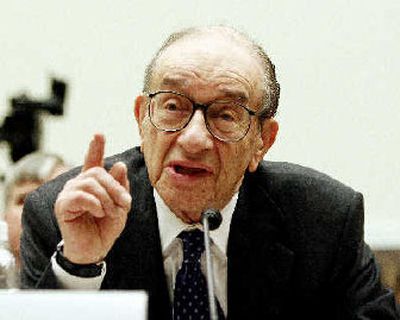Greenspan: ‘No easy choices’

WASHINGTON — With just three months left before he leaves office, Federal Reserve Chairman Alan Greenspan raised a warning to Congress: The country could face “serious economic disruptions” if bloated budget deficits are not curbed.
The Fed chief’s strong comments, made during an appearance Thursday before Congress’ Joint Economic Committee, come after the government produced a $319 billion budget deficit this year — an improvement from the record amount of red ink registered in 2004 but still the third-highest deficit on record.
In the short term, costs related to rebuilding after the trio of devastating hurricanes will make it harder to improve the nation’s balance sheets, he acknowledged. In the long term, a huge wave of retiring baby boomers will put massive strains on government resources, he said.
“There are no easy choices. Easy choices are long gone,” said Greenspan, whose 18-plus year run at the Fed comes to an end on Jan. 31.
Congress is working on separate packages of tax cuts and spending cuts.
Even as he sounded an alarm about the dangers that budget deficits pose to the country’s long-term health, Greenspan struck a more positive note about the economy’s current prospects after being jolted by the recent hurricanes.
Katrina, Rita and Wilma are likely to “exert a drag” on employment and production in the short term and may aggravate inflation pressures, Greenspan said. “But the economic fundamentals remain firm, and the U.S. economy appears to retain important forward momentum,” Greenspan said in his most extensive remarks thus far on the impact of the storms.
The Fed is keeping a close eye on high energy prices to make sure they don’t spark broader inflation.
“We are very firm in the notion that this country should not visit the 1970s again in the way of inflation,” Greenspan said, referring to a period where the economy was rocked by skyrocketing prices.
On the budget front, Greenspan called on Congress to get the nation’s fiscal house in order and bring the swollen deficits under control.
“Unless the situation is reversed, at some point, these budget trends will cause serious economic disruptions,” he said.
Persistently large deficits will eventually push up interest rates, Greenspan said. Higher borrowing costs would weigh on the willingness of consumers and businesses to spend and invest and that could be a drag on economic growth, analysts say.
“I find it utterly inconceivable, frankly” that persistent budget deficits over the long run “will not have a significant impact on long-term interest rates,” he said.
Greenspan repeated his call for lawmakers to restore caps on spending. And, he urged lawmakers to pay for any future tax cuts with either increases in other taxes or reductions in spending. Greenspan said he’d like to see the dividend tax cut extended — but only it it is paid for.